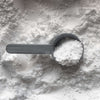The 5 W’s of Protein Powder: A beginner’s guide to boba tea protein powder in 2024

- WHAT is protein powder?
- WHY should you consume protein powder?
- WHO is protein powder for?
- WHEN to consume protein powder?
- WHERE can you get protein powder?
WHAT is protein powder?
We all know that food like meat and dairy have protein, but what exactly is protein powder? Well, it’s exactly what it sounds like - a powdered, concentrated form of protein derived from either animal (i.e., eggs or milk) or plant sources (i.e., soy, pea, rice, hemp, etc.). Protein powder is commonly used by athletes and bodybuilders to help build and repair muscle tissue, but these powder can also be used as a meal replacement or to supplement a diet that is lacking protein.
History
Protein powder's origins may be traced back to the late 19th century, when it was created as a convenient, easily digestible form for those who couldn't get enough protein through food alone. Although it's unclear who invented protein powder as a dietary supplement for athletes and bodybuilders, chances are, several individuals and groups worked on its development over time. Protein powder's earliest versions were derived from milk and typically taken by people recovering from illness or injury.
During the early 20th century, protein powder was primarily used by bodybuilders and athletes as a way to build and repair muscle tissue. Eventually, new manufacturing techniques made it possible to produce protein powder in large quantities at a lower cost, and protein powder finally became available to the general public around the 1960s-70s.
Protein powder gained popularity as a health supplement in the late 1900s, and many different types of protein powders became accessible. The popularity of protein powder rose with the growth of the health and fitness sector, which to this day, is still increasingly as people are becoming more educated and conscious of their health.
One thing to keep in mind is that the protein powders in the early days were very different from those available now. Protein powder production techniques and technology have advanced over time to offer more effective and varied sources of protein.
Given the types of protein powder available, it can be overwhelming to differentiate between them. Gogonuts stands out from the others because of our unique flavors (it's hard to find these flavors anywhere else!) and their superior taste (no weird aftertaste). Definitely give it a try if you love bubble tea but are looking for a healthier alternative - we promise you won't regret it!
How is it made?
Protein from different food sources is isolated and concentrated to create protein powder. Depending on the protein source utilized, the procedure for manufacturing protein powder might vary, although it often entails multiple steps:
- Sourcing: The first step in making protein powder is to source the protein, which can come from a variety of sources such as milk, eggs, or plants.
- Processing: The protein source is then processed to remove any non-protein components, such as fats and carbohydrates. This can be done through a variety of methods, such as centrifugation, filtration, and precipitation.
- Isolation: The protein is then isolated from the non-protein components, this can be done by different methods such as ultrafiltration, ion exchange, and absorption.
- Concentration: After isolation, the protein is then concentrated to increase the protein content. This is typically done by removing water from the protein solution, leaving a powder that is high in protein.
- Drying and packaging: The concentrated protein powder is then dried and packaged, ready to be sold as a dietary supplement.
Protein powder is produced in many ways. For example, whey protein is made by separating the protein from milk, whereas soy protein is made by isolating the protein from soybeans. Moreover, some protein powders could contain extra components including flavours, sweeteners, and vitamins and minerals.
What does it taste like?
What’s the best tasting protein powder? Well, it really depends on personal preference. The taste of protein powder can vary depending on the source of protein and the additional ingredients used.
- Whey protein, which is derived from milk, typically has a slightly sweet and creamy taste. However, whey protein can also have a slight "tangy" or "cheesy" taste, depending on the processing methods used.
- Casein protein, also derived from milk, typically has a milder taste than whey protein but can have a chalky texture.
- Soy protein, which is derived from soybeans, typically has a nutty taste and can be slightly earthy or bean-like.
- Pea protein, which is derived from peas, typically has a neutral taste, but can have a slight earthy or pea-like taste.
- Rice protein, which is derived from brown rice, typically has a slightly grainy or nutty taste.
- Hemp protein, which is derived from hemp seeds, typically has a slightly nutty or earthy taste.
Plant-based protein powders tend to have a stronger, more distinct taste than whey or casein protein, which can be an acquired taste for some people. Additionally, many protein powders come with added flavors such as chocolate, vanilla, or fruit flavors to mask the natural taste of the protein source, making it more palatable to a wider range of people.
To learn more about all these different types of protein, read our blog on The Only Guide You Need to The Most Popular Types of Protein Powder.
Is it healthy?
Protein powder can be derived from many different sources - each source has its own specific amino acid profile and digestibility, which can affect its overall quality.
In general, protein powder can be a healthy supplement to your diet if you choose one that is high-quality, low in added sugars or artificial additives, and if it fits within your overall daily calorie and macronutrient objectives.
What to look for in a protein powder?
There are a few things to think about when selecting a protein powder to make sure you are getting a great product. For instance:
- Protein source: Choose a protein powder that is made from a high-quality protein source. For example, Gogonuts' whey protein powder use high quality, New Zealand grass-fed whey - one of the industry's highest standards.
- Protein content: Look for a protein powder that has at least 20 grams of protein per serving to ensure that you are getting a significant amount of protein. Keep in mind though, that serving sizes may vary - typically an appropriate serving size for protein powder is a scoop, which can range from 25g-40g. Read our blog on How Much Boba Tea Protein Powder Do I Need to Consume to find out exactly how much you should be consuming for your individual needs.
- Added sugars and artificial ingredients: Avoid protein powders that are high in added sugars or artificial sweeteners, colors, or flavors. For example, Gogonuts' protein powder have no added sugar. We use sucralose, and research has shown that sucralose is not metabolized by the body and is considered non-nutritive, which means that it doesn't provide any calories or nutrients. It's also considered safe for consumption by many regulatory agencies, including the US Food and Drug Administration (FDA), the European Food Safety Authority (EFSA), and Health Canada.
- Digestibility: Choose a protein powder that is easily digestible and doesn't cause any digestive discomfort.
- Brand reputation: Look for protein powder brands that have a good reputation for quality and transparency. Visit our website to see what customers are saying about our protein!
- Price: Compare prices and choose a protein powder that fits your budget.
- Personal preferences: Consider your personal preferences, such as taste and texture, when choosing a protein powder. You are more likely to stick with a protein powder that you enjoy drinking. Many protein powder are described to have an unpleasant "aftertaste" - but rest assured, we are confident that our boba protein powder are one of (if not) the best out there and have no weird protein aftertaste!
How to consume it?
We understand that those who have never consumed protein powder may be unsure about how exactly to go about it. Obviously, you first should have a shaker bottle to mix the drink in. From our experience, we find that it’s always better to add the liquid first before adding in the powder to avoid the powder sticking to the bottle at the bottom. We usually like to start with a 1:10 ratio of powder to liquid, and then adjusting from there. For example, if you take a 25g scoop, then we would use 250mL of liquid (around a cup).
How to make my protein shake taste even better?
We’re confident that our powder taste great with just water, but for those who want an even stronger, richer, creamier taste, we would highly recommend substituting water fully or partially with milk (or any milk alternative of your choice). Using milk instead of water will also add some extra essential nutrients.
We encourage you to experiment with different combinations of liquids, and even different flavors of powder to find out which one you like the most!
Check out our Instagram for more fun and interesting content, such as “What Can I Mix My Protein With?” or “Can I Consume My Protein Shake Warm?”
What’s the best way to consume protein powder?
This will depend on your personal preferences, lifestyle, and dietary goals. Here are some factors to consider when deciding how to consume protein powder:
- Convenience: Some people prefer to consume protein powder in a shake or smoothie because it's quick and easy to make, and can be consumed on-the-go.
- Taste and texture: Protein powder can have a range of tastes and textures depending on the brand and type of protein. Some people prefer to mix their protein powder with water or a milk alternative for a simple and refreshing shake, while others prefer to add fruits, nut butter, or other ingredients for a more flavorful smoothie.
- Nutrient needs: The way you consume protein powder can also depend on your dietary needs and goals. For example, if you are trying to lose weight or maintain a low-carb diet, you may prefer to consume protein powder in a shake or smoothie without added sugars or carbohydrates. Alternatively, if you are trying to gain muscle or recover from exercise, you may prefer to consume protein powder in a smoothie with added carbohydrates for energy.
- Lifestyle: The way you consume protein powder can also depend on your lifestyle and schedule. If you have a busy lifestyle and need a quick and easy source of protein, a shake or smoothie may be the most convenient option. However, if you have more time and enjoy cooking or baking, you may prefer to incorporate protein powder into recipes for baked goods, pancakes, or protein bars. Check out our blog on The Most Useful Tips and Tricks for Making Recipes with Protein Powder.
Ultimately, the best way to consume protein powder is the one that fits your personal preferences, dietary needs, and lifestyle, which can look different for everyone.
WHY should you consume protein powder?
Protein powder can have a number of potential benefits for individuals who are looking to meet their daily protein needs or supplement their diet. Some of these benefits include:
- Muscle growth and repair: Protein is essential for muscle growth and repair, and consuming protein powder after exercise can help provide your muscles with the necessary building blocks for recovery and growth.
- Weight loss: Protein is more satiating than carbohydrates or fat, meaning it can help you feel fuller for longer and potentially reduce overall calorie intake. Consuming protein powder as part of a healthy and balanced diet can help support weight loss or weight management goals.
- Convenience: Protein powder can be a convenient and portable source of protein, making it easy to meet your daily protein needs even when on-the-go or in a rush.
- Dietary restrictions: Protein powder can be a useful option for individuals who have dietary restrictions, such as those who follow a vegetarian or vegan diet or those who are lactose intolerant.
- Improved recovery: Consuming protein powder after exercise may help improve muscle recovery and reduce muscle soreness, allowing you to perform better in subsequent workouts.
To learn more about how protein powder can help with your muscle gain and/or fat loss goals, read our blog here.
WHO is protein powder for?
Protein powder is a popular nutritional supplement used by a variety of people, including athletes, bodybuilders, fitness enthusiasts, and anyone looking to increase their protein intake for health or fat loss reasons. Specifically, protein powder is beneficial for:
- Athletes and Fitness Enthusiasts: Protein powder can help support muscle growth and repair after exercise, as well as improve overall athletic performance.
- Vegetarians and Vegans: Protein powder can be a convenient and easy way for those who follow a plant-based diet to meet their protein needs. Check out our line of Boba Vegan Protein Powder here.
- Those on a Weight Loss or Fat Loss Journey: Protein powder can help increase satiety, which may help reduce hunger and promote weight loss. It can also help preserve lean muscle mass during weight loss.
- Older Adults: As people age, they may require more protein to help maintain muscle mass and bone density. Protein powder can be a convenient way for older adults to meet their increased protein needs.
Who should not consume protein powder?
So it seems like protein powder is suitable for almost everyone...right? Well, while protein powder is generally safe for most people, there are certain groups who should take extra precautions when considering taking a protein powder supplement. These individuals include:
- People with kidney disease: Individuals with kidney disease may have trouble processing protein, and consuming too much protein powder could put extra strain on their kidneys.
- Pregnant or breastfeeding women: It’s generally recommended that pregnant or breastfeeding women avoid consuming protein powder supplements, as their safety has not been well established in this population.
- People with food allergies: Many protein powders are made from common allergens (i.e., milk, soy, and egg). If you have a food allergy, it's important to read labels carefully and avoid protein powders that contain your allergen. Those with milk sensitivities can consider trying our vegan protein powder, which are made from soy, while those who are allergic to soy can consider trying our whey protein powder, which are milk-based.
- People with digestive issues: Some people may have difficulty digesting certain types of protein powders, such as whey or casein, which can cause digestive discomfort. Many who have trouble digesting whey protein often find it much easier to digest vegan protein powder.
- Children: Children may not need the extra protein provided by protein powders, and their developing bodies may be more sensitive to the effects of supplements.
If you fall into one of these categories or have any concerns about consuming protein powder, it's always a good idea to talk to your doctor or a registered dietitian before adding any new supplements to your diet.
WHEN to consume protein powder (and HOW MUCH)?
The timing of protein powder consumption can depend on a variety of factors, including your individual needs and goals. Here are some general guidelines for when to consume protein powder:
- Pre-Workout: Consuming protein powder before a workout can help provide the necessary amino acids needed for muscle repair and growth during and after exercise.
- Intra-Workout: Consuming protein powder during a workout can help provide extra energy during the workout, and may be beneficial in preserving muscle while in a fat loss phase.
- Post-Workout: Consuming protein powder immediately after a workout can help replenish glycogen stores and aid in muscle recovery and repair.
- Between Meals: Consuming protein powder between meals can help you meet your daily protein needs and keep you feeling full and satisfied.
- Before Bed: Consuming protein powder before bed can help prevent muscle breakdown during the night, as your body is in a fasted state for several hours.
Should I have a protein shake daily?
Depending on your specific protein requirements and goals, as well as your general dietary habits and lifestyle, you should decide whether or not to consume protein powder every day. Although it can be a handy tool to enhance your protein intake, protein powder shouldn't be used as a replacement for a nutritious and well-balanced diet.
There are different daily recommended protein intakes based on variables like age, sex, weight, and activity level. The average inactive adult requires approximately 0.8 grams of protein per kilogram of body weight per day. Protein needs may be higher in people who are more active or striving to gain muscle. You can read our blog to find out specifically how much protein you should consume to reach your goals.
If you find it difficult to meet your daily protein needs through whole foods alone, protein powder can be a convenient and easy way to supplement your diet. However, it's important to choose a high-quality protein powder that fits your dietary needs and preferences. Moderation is key!
Is it bad to consume protein shakes daily?
Consuming a protein shake every day is not harmful to your health, but you should be aware of the type and amount you are taking in as well as your general diet and lifestyle.
Here are some potential risks to be aware of when it comes to consuming protein powder:
- Excessive protein intake: Too much protein intake, whether from whole foods or supplements, can stress the liver and kidneys and cause dehydration, renal damage, and digestive problems. However, for most healthy individuals, this upper limit is usually difficult to reach.
- Allergies and intolerances: Certain protein powders might cause allergic responses or digestive problems in some people because they contain common allergens like dairy or eggs.
- Contaminants: It has been discovered that some protein powders include heavy metals including arsenic, lead, and cadmium, which can be bad for your health.
To minimize these risks, it's important to choose a high-quality protein powder that fits your dietary needs and preferences and to consume it in moderation. It's also important to meet your daily protein needs through a combination of whole foods and supplements, and to consult with a healthcare professional or a registered dietitian before starting any new dietary supplement or program.
Is it bad to drink protein without exercise and should it be taken on rest days?
Depending on your specific protein needs and goals, as well as your general diet and lifestyle, you should decide whether or not to take protein powder on rest days.
Your requirements for protein during rest days, when you aren't performing demanding physical activity, may be lower than on training days. Either way, protein is still necessary for muscle growth and repair, and consuming a protein shake on days when you're not exercising might help ensure that your body has the amino acids it needs for these functions.
On days when you don't exercise, eating protein powder might be a practical method to supplement your diet if you find it challenging to get the daily recommended amount of protein from whole foods alone. However, it's important to choose a high-quality protein powder that fits your dietary needs and preferences and to consume it in moderation.
What Happens if You Drink Protein Shakes Without Exercising?
Your body may not utilize protein as effectively if you consume protein drinks without working out as it would if you did. This is because during exercise, your muscles are broken down and need amino acids from protein to be rebuilt and strengthened. Consuming protein after working out can help give your muscles the building blocks they need for healing and growth.
Protein shakes and other types of additional protein might cause weight gain if you don't exercise regularly or engage in other forms of physical activity since the body may store the excess protein as fat.
Additionally, some protein shakes may be high in calories and sugar, which can contribute to weight gain and other health issues if consumed in excess.
WHERE can you get protein powder?
Protein powder is widely available and can be purchased from a variety of sources, including:
- Health food stores: Many health food stores carry a wide selection of protein powders, including plant-based and whey-based options.
- Online retailers: There are many online retailers (like us!) that specialize in health and fitness supplements, including protein powder.
- Grocery stores: Many grocery stores now carry protein powders, especially those that have a health and wellness section.
- Supplement shops: Supplement shops that specialize in bodybuilding and fitness supplements often have a wide selection of protein powders.
Currently, Gogonuts is available in some retail locations. If you are a retailer or a gym that would be interested in carrying our products, please feel free to reach out to us via email at wholesale@gogonuts.shop.
Summary
Alright, so there you have it. Did we answer all the questions you had about protein supplementation? If we missed anything, feel free to reach out and ask us any questions you may have!
One final note is that protein shakes should be viewed as a supplement to a healthy and balanced diet, rather than a replacement for whole foods.
If you’re ready to try some delicious boba protein shakes, we’ll be waiting for you!








